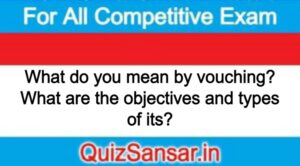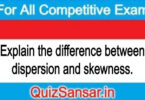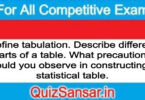
What do you mean by vouching? What are the objectives and types of its?
What do you mean by vouching? What are the objectives and types of its?
Ans.
VOUCHING: ITS MEANING
A voucher is a documentary evidence in support of a transaction in the books of account. The act of establishing the accuracy and authenticity of entries in the account books is called vouching. Ronald A. Irish of Australia defines vouching as “vouching” is a technical term which refers. to the inspection by the auditor of documentary evidence supporting and substantiating a transaction. Vouching is considered to be the essence of auditing and therefore the auditor should be very careful while vouching, Vouching means to substantiate an entry in the books of account not only with any documentary evidence such as agreements, receipts, counterfoils of a receipt book or paying-in-book, contracts, but also to see that the transaction has been properly authorized, recorded and entered in the books of account, e.g., verification of the entries in the invoice book with the invoices, checking of the cash receipts with the counterfoils of the receipts book, the checking of the cash payments with the receipts issued by the payee and so on. Vouching means testing the truth of items appearing in the books of original entry. The success of an auditor in vouching depends upon his intelligence, critical bent of mind, common sense, observation and tact with which he handles his work. He should go beyond the books of account and go to the source of a transaction. If he simply compares the entry, say, on the credit side of a cash book with the voucher, it is possible that he might be deceived, e.g., the purchase might not have been for the business or the receipt might have been for the previous year. If it is a receipt side entry and if he compares the entry with the counterfoil of the receipt book, it is possible that less amount might have been entered on the counterfoil than the money which has actually been received. Again a person might have sent two or three amounts but only one receipt for all the amounts might have been issued while the three amounts might have been shown on three different counterfoils of the receipt book. The second or the third blank receipt might be issued to other persons who have sent money-which might have been misappropriated. Clever frauds can be discovered only by proper vouching. Therefore, it is very important that the auditor should vouch the items with great care and intelligence. It is through vouching that an auditor can satisfy himself as to the authenticity and completeness of transactions in the books of accounts. In case he is negligent, he will be held guilty as was decided in the case of Armitage vs. Brewer & Knott.
Vouching also means checking of additions, ledger postings, extracting of balances in the ledger, etc. The extent to which the auditor should check will depend upon the size of the business, the accounts of which he is auditing. If it is a big business, efficient internal check will be in operation and hence the auditor will be justified in relying upon a few test checks, while in a small business, internal check may not be in operation and hence the auditor will have to check every entry. To be on the safe side, the auditor will do well to check the entries to detail because the curtailment of work not in any way reduce his responsibility.
OBJECTS OF VOUCHING
The objects of vouching are :
(1) Knowledge of Business Transactions- To check that there is no omission of any entry and all transactions relate to the period under audit.
(2) Knowledge of Transactions Unrelated to Business- To check that all transactions related to the nature of business and expenditures are proper business charge.
(3) Verification of Accounts- First object is to verify the authenticity of the business transactions and to ensure that all transactions have been duly authorized.
(4) To check that all transactions are correctly recorded in the books of accounts.
(5) To verify cash in hand and at bank.
(6) To defect if there is any misappropriation of cash or goods.
(7) To see that the payments have been duly received by the correct payers.
(8) The vouching in support of the entries is legally valid with regard to its date, authority, related to business concern etc.
(9) “It should be realized, however, that the very nature of vouching renders it a practically indispensable phase of every audit and that where curtailment of the auditor’s duties in this direction is completed that risk may be incurred should not be over looked.
-Lancaster
“Vouching is the essence of auditing.”
“One of the principal object of vouching is to ascertain not only that money has been actually paid away by the business.”
-Spicer and Pegler.
“Vouching is the very essence of auditing and the whole success of an audit depends upon the intelligence and thoroughness with which this part of the work is done.”
-De Paula
These are as under:
(1) Whether the transaction is related to business.
(2) Whether the transaction is genuine.
(3) Whether the transaction is properly recorded in the books.
(4) To know the true and fairness of the transaction.
(5) Authorized entries.
(6) Knowledge regarding to the business transactions.
DEFINITION OF VOUCHES
“A voucher is any documentary evidence in support of a transaction.”
-Arthur W. Homes
“A voucher may be defined as only documentary evidence by which the accuracy of best entries may be substantiated.
-Lancaster
“A voucher may be a receipt, an invoice, an agreement, a material requisition slipor, in short any suitable written evidence which confirms a written transaction.”
-Ronald A. Irish
“A voucher may be defined as a documentary evidence of an entry appearing in books of accounts.
-J. R. Batlibri
TYPES OF VOUCHER
These are as under:
(1) Primary Vouchers- These are original evidence of the transaction. For example: for goods purchased-cash receipt or memo.
(2) Secondary or Collateral Voucher- These are produced when primary voucher is not available. These may be in the form of carbon copy.
- What is meant by Database Management System?
- Discuss the advantages and drawbacks of database.
- What do you mean by database ? Discuss its Characteristics.
- What is Data Mining?
- What are the conditions of communication?
- What do you mean by business communication ?
- organization / Differentiate between classical and modern theory of organization
- What is forecasting






